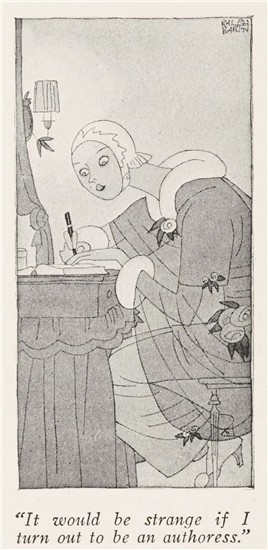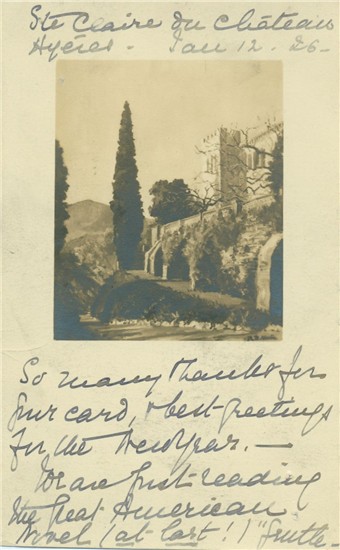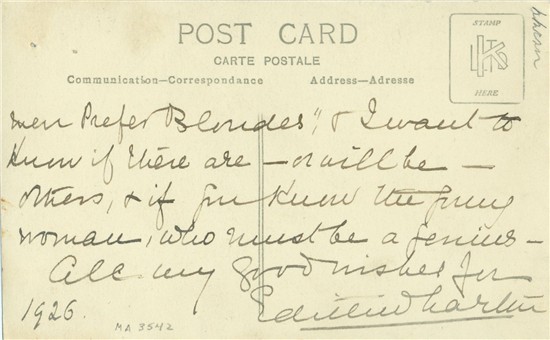Was the gold-digging protagonist of Gentlemen Prefer Blondes a proto-blogger? Curator Christine Nelson revisits this jazz-age novel written in the form of a diary.

Illustration from the first edition of Gentlemen Prefer Blondes,by Anita Loos (1894–1981); The Morgan Library & Museum; purchased as the gift of Christopher Wold Johnson.
Mention Gentlemen Prefer Blondes and most of us summon up the image of a platinum-haired Marilyn Monroe sheathed in cotton-candy pink and gushing about her best friend: the diamond. But decades before Marilyn slithered into the role, Lorelei Lei started out as the provocative creation of writer Anita Loos. Her jazz-age novel (the manuscript of which is in the Morgan's collection) caused a sensation when it was published in 1925, and its sometimes-forgotten subtitle—The Illuminating Diary of a Professional Lady—reads like the heading of a tell-all social blog. Indeed, I'd like to put forth Lorelei Lee as the mother of all bloggers, the patron saint of everyone who has realized that all it takes is something to say (and it needn't be much) and a blank page (or screen) to turn us into published authors.
Like Pride and Prejudice, Blondes has a memorable beginning: “A gentleman friend and I were dining at the Ritz last evening and he said that if I took a pencil and a paper and put down all of my thoughts it would make a book. This almost made me smile as what it would really make would be a whole row of encyclopediacs. I mean I seem to be thinking practically all of the time.” What a stunning opening! In just a few hilarious words Loos not only introduces one of literature's most memorable narrators; she also defines the diary (and its public counterpart, the blog): a place, infinitely expandable, in which to record the never-ending flow of one's thoughts over time.
When her friend sends a bound volume over as a gift, Lorelei tells her maid, “Well, Lulu, here is another book, and we have not read half the ones we have got yet.” But she soon realizes that she needn't be concerned: “when I opened it and saw that it was all a blank I remembered what my gentleman acquaintance said, and so then I realized that it was a diary. So here I am writing a book instead of reading one.” Never mind all those unread books on the shelf—Lorelei can turn her own life into a book!
“It would be strange if I turn out to be an authoress,” Lorelei admits. After all, she tried to be a musician but ended up throwing her mandolin against the wall in frustration. “But writing is different,” she declares, “because you do not have to learn or practice.” With tongue firmly in cheek, Loos (through Lorelei) hits on a key rule of blogging: anyone can do it! While traditional publishing venues admit only a select few, the blogosphere has no filtering process—no pesky editors with their soul-crushing rejection letters. Even if your mind is as (apparently) empty as Lorelei's, you can go for it! The world may be listening!
The lure of the private diary is that it gives us a safe space to express whatever is on our minds, however inane it may seem, however embarrassing or ill-formed. There are no prerequisites (except the ability to read and write). A blog gives us a chance to do the same—for an audience. And Lorelei Lei is always eager for an audience, a new admirer who might lead her to a new piece of jewelry. In fact, before long Lorelei's diary has turned into performance, much like a blog: “I am taking special pains with my diary from now on,” she explains, “because I am really writing it for Gus. I mean he and I are going to read it some evening in front of the fireplace.” With this transformation, some of Lorelei's thoughts become, ironically, too private to be confided to her diary! It becomes, instead, a place to put forth a carefully crafted identity, complete with name-dropping, embellishment, and self-vaunting. Sound familiar?
But let's not be too hard on Lorelei. She gave voice to a tell-all generation, and no less than the great Edith Wharton declared (in a postcard in the Morgan's collection, pictured below) Gentlemen Prefer Blondes to be “the great American novel—at last!” The drive to fill rows of “encylopediacs” with the stories of our lives will endure, or, as Lorelei put it, “when a girl has a lot of fate in her life it is sure to keep on happening.” And the diary, too, will keep on happening, whether on paper or online.


Postcard from Edith Wharton to Frank Crowninshield, 12 January 1926; The Morgan Library & Museum; purchased on the Fellows Fund as the gift of Frederick R. Koch, 1981.
Christine Nelson is the Morgan's Drue Heinz Curator of Literary and Historical Manuscripts and curator of the exhibition The Diary.
